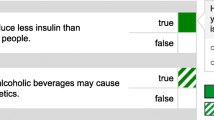Abstract
How can our social brain aid our academic learning? Which role do our emotions play in learning? Can collaborative learning lead to improved academic achievement and, arguably more importantly, help knowledge transfer into the real world? This paper researches neuroscience, cognitive psychology, social interdependence and social learning examining the role of collaboration in learning. It researches empirical data, including meta-analyses and studies, into collaborative interactive learning, in order to support the argument that collaboration leads to increased academic achievement compared to students who learn via traditional methods. Finally, it identifies six factors crucial to effective collaborative learning: accountability, versatility, ambience, comprehensibility, amalgamation and recapitulation (AVACAR).
Access this chapter
Tax calculation will be finalised at checkout
Purchases are for personal use only
Similar content being viewed by others
References
Gokhale, A.A.: Collaborative learning enhances critical thinking (1995)
Barkley, E.F., Cross, K.P., Major, C.H.: Collaborative learning techniques: a handbook for college faculty. Wiley (2014)
Johnson, R.T., Johnson, D.W.: Cooperative learning in the science classroom. Sci. Child. 24, 31–32 (1986)
Vygotsky, L.S.: Interaction between learning and development. Mind Soc. 79–91 (1978)
Lieberman, M.D.: Education and the social brain. Trends Neurosci. Educ. 1, 3–9 (2012). https://doi.org/10.1016/j.tine.2012.07.003
Immordino-Yang, M.H., Damasio, A.: We feel, therefore we learn: the relevance of affective and social neuroscience to education. Mind Brain Educ. 1, 3–10 (2007). https://doi.org/10.1111/j.1751-228X.2007.00004.x
Solso, R.L., MacLin, O.H., MacLin, M.K.: Cognitive Psychology: Pearson New International Edition. Pearson Higher Ed (2013)
Tomasello, M., Carpenter, M.: Shared intentionality. Dev. Sci. 10, 121–125 (2007). https://doi.org/10.1111/j.1467-7687.2007.00573.x
Sloman, S., Fernbach, P.: The knowledge illusion: Why we never think alone. Penguin (2018)
Springer, L., Stanne, M.E., Donovan, S.S.: Effects of small-group learning on undergraduates in science, mathematics, engineering, and technology: a meta-analysis. Rev. Educ. Res. 69, 21–51 (1999). https://doi.org/10.3102/00346543069001021
Gallistel, C.R., Matzel, L.D.: The neuroscience of learning: beyond the hebbian synapse. Annu. Rev. Psychol. 64, 169–200 (2013). https://doi.org/10.1146/annurev-psych-113011-143807
Geake, J., Cooper, P.: Cognitive neuroscience: implications for education? Westminst. Stud. Educ. 26, 7–20 (2003). https://doi.org/10.1080/0140672030260102
Hebb, D.O.: The Organization of Behavior (1949)
Goswami, U.: Annual review neuroscience and education. Most 74, 1–14 (2004). https://doi.org/10.1348/000709904322848798
Krashen, S.: Principles and Practice in Second Language Acquisition (1982)
Johnson, D.W., Johnson, R.T.: An educational psychology success story: social interdependence theory and cooperative learning. Educ. Res. 38, 365–379 (2009). https://doi.org/10.3102/0013189X09339057
Johnson, D.W., Johnson, R.T., Smith, K.: The state of cooperative learning in postsecondary and professional settings. Educ. Psychol. Rev. 19, 15–29 (2007). https://doi.org/10.1007/s10648-006-9038-8
Deutsch, M.: A theory of co-operation and competition. Hum. relations. 2, 129–152 (1949)
Wentzel, K.R.: Relations of social goal pursuit to social acceptance, classroom behavior, and perceived social support. J. Educ. Psychol. 86, 173 (1994)
Bargh, J.A., Schul, Y.: On the cognitive benefits of teaching. J. Educ. Psychol. 72, 593 (1980)
Topping, K.J.: The effectiveness of peer tutoring in further and higher education: a typology and review of the literature. High. Educ. 32, 321–345 (1996)
Bratman, M.E.: Shared cooperative activity. Philos. Rev. 101, 327–341 (1992)
Bandura, A., Walters, R.H.: Social Learning Theory. Prentice-hall Englewood Cliffs, NJ (1977)
Chickering, A.W., Gamson, Z.F.: Seven principles for good practice in undergraduate education. AAHE Bull. Mar. 3–7 (1987). https://doi.org/10.1016/0307-4412(89)90094-0
Freeman, S., Eddy, S.L., McDonough, M., et al.: Active learning increases student performance in science, engineering, and mathematics. Proc. Natl. Acad. Sci. 111, 8410–8415 (2014). https://doi.org/10.1073/pnas.1319030111
Bloom, B.S., Englehard, M.D., Furst, E.J., et al: Taxonomy of educational objectives: the classification of educational goals. Handbook I cognitive domain. New York, 16, 207 (1956). https://doi.org/10.1300/j104v03n01_03
Schultz, R.B.: Active pedagogy leading to deeper learning: fostering metacognition and infusing active learning into the GIS&T classroom. Teach. Geogr. Inf. Sci. Technol. High. Educ. 133–143 (2012). https://doi.org/10.1002/9781119950592.ch9
Bowen, C.W.: A quantitative literature review of cooperative learning effects on high school and college chemistry achievement. J. Chem. Educ. 77, 116 (2000)
Hake, R.R.: Interactive-engagement versus traditional methods: a six-thousand-student survey of mechanics test data for introductory physics courses (1998)
Prince, M., Bucknell, U.: Does active learning work? A review of the research. J. Eng. Educ. 93, 223–231 (2004)
Johnson, D.W., Johnson, R.T.: Cooperation and Competition: Theory and Research. Interaction Book Company, Edina, MN, US (1989)
Romero, C.C.: Cooperative learning instruction and science achievement for secondary and early post-secondary students: a systematic review. Colorado State University (2009)
Ebbinghaus, H.: Über das gedächtnis: untersuchungen zur experimentellen psychologie. Duncker & Humblot (1885)
Karpicke, J.D., Roediger, H.L.: The critical importance of retrieval for learning. Science (80-) 319, 966–968 (2008). https://doi.org/10.1126/science.1152408
Stump, G., Hilpert, J., Husman, J., et al.: Collaborative learning in engineering students: gender and achievement. J. Eng. Educ. 100, 475–497 (2011)
King, A.: From sage on the stage to guide on the side. Coll. Teach. 41, 30–35 (1993)
Author information
Authors and Affiliations
Corresponding author
Editor information
Editors and Affiliations
Rights and permissions
Copyright information
© 2020 Springer Nature Switzerland AG
About this paper
Cite this paper
Docherty, M. (2020). Collaborative Learning: The Group is Greater than the Sum of its Parts. In: Auer, M., Tsiatsos, T. (eds) The Challenges of the Digital Transformation in Education. ICL 2018. Advances in Intelligent Systems and Computing, vol 916. Springer, Cham. https://doi.org/10.1007/978-3-030-11932-4_3
Download citation
DOI: https://doi.org/10.1007/978-3-030-11932-4_3
Published:
Publisher Name: Springer, Cham
Print ISBN: 978-3-030-11931-7
Online ISBN: 978-3-030-11932-4
eBook Packages: Intelligent Technologies and RoboticsIntelligent Technologies and Robotics (R0)




